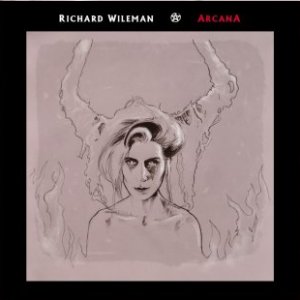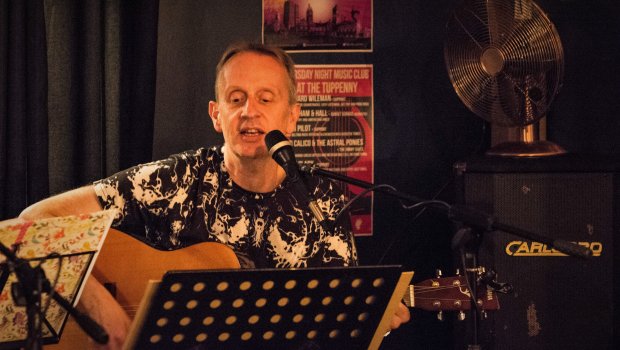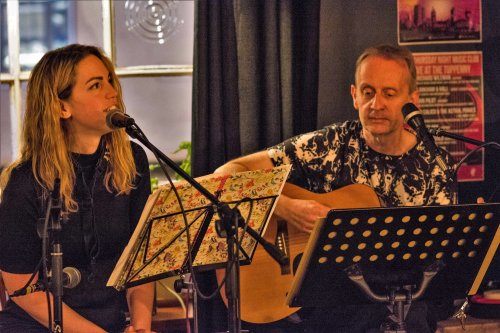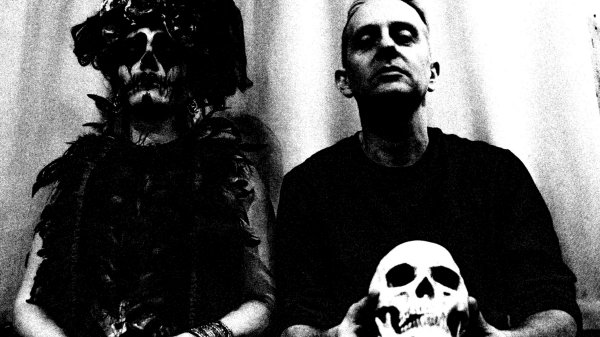With an unexpected new album released under the name of his Karda Estra alter ego – hard on the heels of his Arcana solo album – main-man Richard Wileman talks to TPA about Idols In The Flesh and many other things…
 You’ve been very prolific of late, with the 1st September release of your solo album Arcana,and the 3rd October Karda Estra release Idols in the Flesh. It seems that where a lot of us are stuck under a cloud of CV-19 provoked ennui, the current weird times we live in have proved a boon to your creativity?
You’ve been very prolific of late, with the 1st September release of your solo album Arcana,and the 3rd October Karda Estra release Idols in the Flesh. It seems that where a lot of us are stuck under a cloud of CV-19 provoked ennui, the current weird times we live in have proved a boon to your creativity?
Yes, via the added pressure of my day-job work instantly drying up! My Arcana solo album was always going to happen, lockdown meant I had more free time to focus on it, which meant it was finished and released earlier than originally planned. Idols in the Flesh was much more unexpected however. After Arcana was completed, I began to search through my old Karda Estra archives, just out of curiosity really. I have a lot of unreleased material as well as samples and sections of the orchestral musicians that work on the project. Because the music was unused and ‘in the past’, I guess I was less precious about it than normal. So I began experimenting with some of it, being quite cruel really, ripping it apart, extreme pitch shifting and time stretching, reversing, etc., until it was unrecognisable from its origin. And I found I really liked it and so proceeded from there, adding new overdubs and sometimes composing from the ground up with the extreme editing in mind. It was a flurry of activity that came about directly because I had more free time. I’m not really one to sit down and have box set days!
Arcana is a delightfully mysterious collection of songs, based around Tarot cards. Tell us something about how those songs evolved.
Some of these songs, like Seed Sown, Mind Blown, go back a couple of years and were written around the same time some of the songs from my second solo album Cabal of a Thousand Souls. And Amy (Fry) and I have been playing them live for a while. But I find different songs bake at different rates until they feel ready to record, so I had a few in the ‘maybe’ list for solo album 3. During this time, my girlfriend Nikki bought me a set of tarot cards. Although I had not previously been into tarot, I had always loved the imagery of the deck that was illustrated by Pamela Colman Smith, combined with a long-lasting affection for Steve Hackett’s tarot album Voyage of the Acolyte which I discovered as a teenager. These were my only two previous connections to it. By chance though, one of my then currently ‘baking’ songs was already called The Sun & The Moon (which are two tarot cards) and slowly, the idea formed to make a tarot-based album. Fortunately, the tarot covers many emotions and ideas and the songs I had written seemed to easily fit into its scheme – like I feel Night of the Living Doll has a strong connection with the Judgement card’s meaning. I then actually wrote some instrumentals to go with specific cards (like The Devil, etc) as well, slightly altering a song which became The Star as it had the line “We were forged in the same sun” and its lyrics in general also resonated with that card’s interpretation. I like how it came together like this. It seems a less obvious route than if I had specifically sat down to write ‘tarot lyrics’. I do like outside intervention and acts of chance in my composing process to spice things up.
Kavus Torabi’s label seems a natural home for Arcana, as there are some atmospheric similarities with Kavus’s own recent solo album. How did the hook up with Believers Roast come about?
I asked Kavus if he wanted to collaborate with me over a decade ago and he kindly agreed and we co-wrote/recorded two pieces on my Karda Estra New Worlds album in 2011 that only came out at the time as a download as my previous label, Cyclops, had called it a day.
Then we also did a bit of co-writing on the follow-up Mondo Profondo in 2013. I decided I wanted to release both albums on a 2-for-1 CD and asked if he’d like to put them out on his Believers Roast label and he loved the idea. We just seem to have struck up this kind of working relationship since then. Next he co-wrote a track on my Strange Relations album in 2015 with Muffins drummer Paul Sears and myself, and that came out on Believers Roast.
In between, he asked me to contribute a track for his Exquiste Corpse Game album. The next two Karda Estra albums, Time and Stars and Infernal Spheres came out on Believers Roast, as did my debut solo Veil. I also release stuff like Cabal of a Thousand Souls and Idols in the Flesh on my own No Image label because I don’t want to swamp him, bless him! It means a lot to me that he supports my stuff so much as I am a big fan of what he does – right from Cardiacs through Knifeworld and his many other projects. His solo album Hip to the Jag released this year is very beautiful.
 Turning to Idols in the Flesh, which is something of a departure from the signature sound of Karda Estra, what inspired you to explore the dark ambience we hear?
Turning to Idols in the Flesh, which is something of a departure from the signature sound of Karda Estra, what inspired you to explore the dark ambience we hear?
As I started using pre-existing unused but still composed pieces as the starting point from my Karda Estra archive, they already had that dark Gothic feel I love so much, particularly in the chord structures. There was also the lovely organic movement inherent in violins, classical guitar, trumpet, etc., that even when heavily manipulated they still retain their energy and have a beautiful tension. These new pieces were an experiment to begin with that I just fell in love with and decided I’d like to release it. I already had done the cover drawing which I swiped from another work in progress as it suited the atmosphere nicely, so that was ready to roll. However, it just felt right to release it as a Karda Estra album rather than under my own name, even though I’d really laid KE to rest. Or so I thought! It’s quite poetic it gets resurrected! It’s not like any previous KE albums but I have often stretched the limits within that project – Voivode Dracula is quite different to Equilibrium which is quite different to Strange Relations and so on.
How does the composition process of Idols differ from the way you put the songs together on Arcana? Is there an element of improvisation, or is it all scored?
Well my more ‘straightforward’ composing and songwriting still does have varying degrees of chance within it, both musically and lyrically. But in the end, I guess it’s quite focused as I work towards the finished result, polishing things up, even if there are some improvised aspects. It still comes down to getting the right chords and arrangements to convey properly either what I am trying to say or just simply sound good. And Arcana is a good example of this. With Idols in the Flesh, because I was really ripping things apart, I was much more focused on finding new happy accidents as a basis to work from. But the starting points and overdubs were still composed and I guess most improvisation, if it can be called that, was done in a digital way – i.e. if I press this, I wonder what will happen? I still wanted the great chords, even if they became more like extended cosmic ethereal vibrations! And Idols in the Flesh, Pt.2 and parts of The Unhappy Breed (which takes the main theme from KE track The Happy Breed) are still quite ‘straightforward’. Despite my perchance for the weird and the wonderful, I do have a lot of fun recording and inject hidden fun into my music. For example, the very odd worded section in Idols, Pt.4 where Amy sounds practically demonically possessed is not actually singing at all. When I recorded her harmonies for this track, I accidentally recorded her saying “that was rubbish” at the end of the track. It’s that phrase reversed and time stretched that sounds so amazing and eerie. Maybe I shouldn’t break the spell by giving away these type of secrets?!
How did Karda Estra come about?
In 1997, my previous band split up. Also around that time, home digital recording equipment became affordable so I started what would become KE as I now had the time to experiment with new ideas without the pressure of the studio clock ticking. It was very liberating and I think let me develop a more unique sounding project.
I was going to ask if you have always “flown solo” musically, but it seems not. I only ask because some musicians seem more suited to solo work rather than being in a band. Eno, Bill Nelson, etc – you’re in good company!
Yes, I have been in bands, but I guess you would say I was the driving force in those too! I suppose I like being in the pilot’s chair but when I do collaborations or other stuff, I’m perfectly happy to do as I’m asked and let someone else have the pressure!
I was wondering if you had a classical background?
No, I was not good at music at school and dropped it. Plus my mum tried to teach me keyboards as a teenager but it didn’t click. I loved listening to music however and was a huge fan. I got an electric guitar at 16 and was obsessed and started a band by age 17. That was all self-taught by listening to Black Sabbath, NWOBHM and proggy stuff. By 19 I had become familiar with Steve Hackett’s Bay of Kings album and this prompted me to have a couple of years’ classical guitar lessons which greatly informed later recordings. I also became very into 20th Century classical music and soundtracks, although I’d already enjoyed some classical music as a child, like Saint-Saëns’ Danse Macabre. When I started Karda Estra, I used scoring programs for the classical musicians but decided to change to pencil and paper later to try and stretch my brain. I am not fluent but I get by.
You have been recording as Karda Estra for over 20 years now, and there is fair sized back catalogue over on Bandcamp (well worth investigating, dear reader!). Do you have any personal favourites?
If I’m honest, I’m very fond of them all but I can signal some out… The third album, Eve (2001), felt like all the work and ideas from the first two coalesced in a way that I was ready to tackle a full length Gothic concept album. It was well received and one of my best sellers along with the two follow-ups, Constellations and Voivode Dracula, although the three that followed those were possibly compositionally stronger. Strange Relations was a huge challenge as Paul Sears was such a tricksy drummer to compose alongside, but I think it makes a fascinating listen. Time & Stars and Infernal Spheres explored the cosmic/astronomical/philosphical side of things pretty well I think.
Moving on to more general topics, the Chancellor’s recent statement that creatives should retrain and do something useful – I paraphrase, but that’s the gist – just how angry did that off the cuff blasé pronouncement make you?
To be honest, that attitude is something most creative people have had to put up with all the time as they often work on the fringes. To survive in any creative industry, you really have to work above and beyond in terms of dedication, hours put in, etc., plus keep having as many strings to your bow as possible. You could say this about many professions of course but the point to be made is that the arts are not in some way ‘lesser’ – either to the economy or contribution to society.
How do you see the underground live music scene coming out of this? Given the lack of government support, it’s difficult to see how it can return to the pre-Covid days, and I for one miss going to gigs probably more than anything else right now.
I can’t see how anything other than major damage will happen to venues large and small, plus festivals and all the connected businesses. Amy and I are going to do our first live (as opposed to streaming live) socially distanced gig this Friday in a pub. It will be the first in seven months. My day job is a community musician working with adults with learning disabilities. Obviously no face to face stuff at the moment and I’m converting it to online which has plenty of challenges in itself. Zoom et al has its place but live music has a particular magic, connection and energy. Whether in a care home or gigging my own music, I can safely say that I’m missing it a lot.
We should end back in the music world, so what is coming up next in the musical universe of Richard Wileman?
I’m always writing and scheming. I have plenty of new/old unheard songs that I’d like to record and I have plenty of other Karda Estra pieces I want to arrange for live or re-recorded acoustic versions. I would like to do more ambient Karda stuff. I have loads of nice cover versions that would be fun to do sometime – Amy sings a fab version of I Say A Little Prayer live. I have some possible collaborations coming up, the next one is for a new Spirits Burning album with whom I’ve done a fair bit of work now. Plenty to keep me busy!
Finally, if you were allowed the entire back catalogues of only four musicians for the rest of your time here on Earth, who would they be?
Ones with big discographies!!! This is incredibly difficult as I love so many musicians, but I guess today it would be:
1. Ennio Morricone as he is ‘the Maestro’.
2. Vaughan Williams for being the king of chords.
3. Steve Hackett, because I would get a big chunk of the Genesis back catalogue and his beautiful classical guitar albums.
4. Paul McCartney because I’d get The Beatles too.
Those four cover quite a lot of bases!
Thanks, Richard, that was all most illuminating. We here at TPA Towers wish you all the best for the future, uncertain as it may be!
And you can read Roger’s review of Idols in the Flesh HERE.
LINKS
Richard Wileman/Karda Estra – Website | Facebook | Bandcamp



